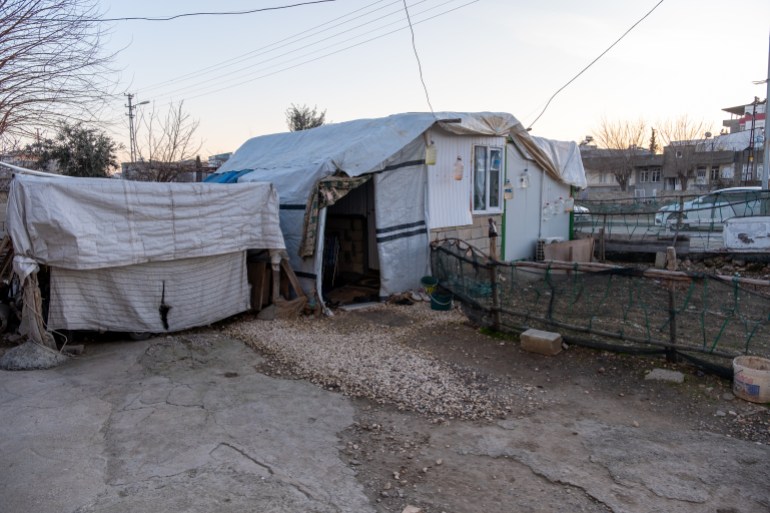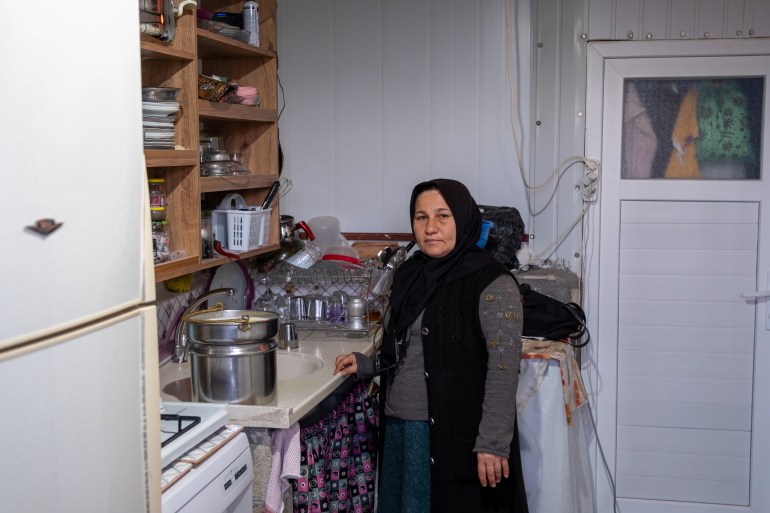Adiyaman, Turkey – When Adile Yetkin went to register her child at school recently, she eyed the three steps she would have to climb to enter the building anxiously. Her prosthetic leg had never worked right, tormenting her with its rigidity and dead weight.
Yetkin hauled herself up the first step, then the second but on the third, the prosthesis gave way, becoming detached and leaving her stranded until someone could come and help her.
“Now I’m afraid to go anywhere in case it happens again, and I always need someone with me,” she told Al Jazeera.
The 41-year-old now mostly confines herself to the two-roomed prefabricated container she shares with her husband and three remaining children in the southeast Turkish city of Adiyaman. One year ago, her eldest son was killed in the devastating earthquake that also destroyed her home and took one leg each from her and her husband.
More than 50,000 people are believed to have died in southern Turkey as a result of the magnitude 7.8 and 7.5 earthquakes on February 6, 2023. The death toll in Adiyaman – population 300,000 – was more than 8,000 while about 17,500 more were injured.
The United Nations estimates that as many as 70 percent of the roughly 100,000 people injured by the earthquakes in Turkey have a disability as a result.
Life is hard enough for earthquake survivors in Turkey. It is harder still for amputees.

Pinned down by the body of her dead son
In the centre of Adiyaman, a clock tower remains stuck at 4:17am, the time when the first earthquake struck.
At that moment, the Yetkin family were woken by the violent shaking and tried to flee their apartment on the first floor of a three-storey building. As they gathered the children and reached the hallway leading to the front door, the building collapsed on top of them.
Dazed and trapped under rubble, they saw that debris was propping up the ceiling about a metre (three feet) above where they lay. As they called out to each other, 18-year-old Yusuf did not respond. He was lying on top of Adile – he had thrown himself over his mother to protect her as the building crumbled. She felt for his breath, but there was nothing.
Adile’s left leg and one of her arms were trapped under the debris, while the body of her dead son was pinned on top of her.
Hasan, her husband, was folded over in a prayer-like position, one of his legs crushed by a heavy door. Muhammet, then 15, had a broken leg, while the youngest children, Enes, then 13, and Berat, then 7, were less badly hurt.
The family shouted and shouted for help as they lay trapped and in agony. But it was several hours before Hasan’s nephew managed to force an opening in the rubble through which they could communicate and pass water.
Two rescue teams tried to get them out during the first couple of days, but failed because they couldn’t remove the debris holding up the ceiling. On the third day, a team of miners tunnelled underneath to rescue them. By the time they were finally released, the family had been trapped for about 40 hours.
“[My family’s] psychology was really bad [under the rubble], I was trying to tell them – it will pass, we will be fine. But after I got out, I lost my mind,” Adile said. “I don’t remember anything after that for days.”
There was no chance of saving Hasan’s left leg, and it had to be amputated above the knee. His right leg was broken but was saved. Muhammet’s badly broken leg was also saved.
The doctors battled to save Adile’s left leg. She was airlifted to a hospital in Ankara, but gangrene had set in. The doctors first had to amputate it above the knee, then later cut it back further, almost to the hip, when it was clear the gangrene had remained.

‘I just thank God we’re alive’
Months of recovery and physiotherapy followed, and both Hasan and Adile were fitted with prostheses paid for by the state, although relatives and friends helped them pay 40,000 Turkish lira ($1,307) for additional features.
But Adile said that since so little remains of her left thigh, it makes her prosthesis hard to use.
“So even though they use a silicone fit, it’s not working well,” she said.
Her prosthetic leg has two settings – straight for standing upright and bent for sitting down. Most movement becomes an ordeal. A better prosthetic leg could help, but the couple must wait for the state to provide one.
“We don’t know when that could be, it could be five years later,” Hasan said.
The 46-year-old is still getting used to his prosthesis, but so far it’s working quite well – he can move around with the aid of a crutch.
“I just thank God we’re alive,” he said.
However, the former baker can no longer work and the family has been left destitute – reliant on the help of relatives, friends and neighbours as the cost of living soars.
“The earthquake really affected disabled people’s lives – they mostly got stuck in their houses or containers,” Huseyin Er, the president of Gokkusagi, a local humanitarian NGO, told Al Jazeera.

‘The whole city needs psychological support’
About 70 percent of Adiyaman city’s buildings were either destroyed or damaged in the earthquakes, along with widespread damage to infrastructure, roads and pavements.
The scale of the remaining damage makes it harder for disabled people to navigate the city, Er explained, adding that the many container sites in Adiyaman lack suitable toilet facilities, beds or tailored support services for disabled people.
The government plans to provide a container site designed for disabled people in Adiyaman, but it has not been delivered yet.
The Yetkin family felt they would not get the support and facilities they need in a state-provided container site, so they live in a single container in the street donated by a neighbour.
“Relatives can help us here – they built a toilet by their own efforts. They put a seat in the toilet [for the shower] – they try to adapt it to fit our needs,” Adile said.
The family received single payments of 10,000 lira ($327) and then 15,000 lira ($490) from Turkey’s Disaster and Emergency Management Authority (AFAD). But not living in the container sites means they are not eligible for 3,000 lira ($98) monthly support on payment cards provided by AFAD.
Gokkusagi has provided the Yetkin family with some financial support, food and hygiene products.
The NGO – which partners with international groups such as Concern Worldwide and the UN High Commissioner for Refugees (UNHCR), as well as the European Union – works to identify the needs of the most vulnerable people in the city to provide aid and support, and refer them on to state services.
“Our NGO also helps disabled people with portable toilets – for example, for people in wheelchairs – to make their lives easier,” HR and finance officer Kadir Boztepe said.
“But [our support] is not enough for what Adiyaman needs – we’re just one NGO and what we can do is limited.”
Er said humanitarian organisations still don’t know how many people in Adiyaman lost limbs to the earthquake, but they believe it’s a significant number.
“There are still people outside of Adiyaman city in hospital getting treatment for lost limbs,” he said.
“[And] what I see for the long term, is that the whole city needs psychological support.”

‘It will take time’
For the Yetkin family, the death of Yusuf has been like undergoing another amputation.
“February 6 reminds us of our loss – we miss our son so much, it’s so tough. Only those that experienced it know how bad it is,” Adile said. “He was 18 years old and we loved him and cared for him so much.”
They eschew professional psychological support in favour of support from relatives and take refuge in the Quran.
“We understood that everything is for nothing – it’s not worth getting angry, it’s not worth fighting. So our connections are stronger now. We also have better connections with relatives,” she said.
“[In the future], all I want is to take care of my kids, to cook for them properly.”
While they rented their apartment in the ruined block they lived in, they own land elsewhere in the city and so should qualify for a home built by the state-backed Housing Development Administration (TOKI). However, there’s still no information about when that will be available.
By January this year, just 46,000 housing units had been delivered across Turkey, according to Environment and Urbanisation Ministry data, of the 319,000 new housing units that President Recep Tayyip Erdogan pledged would be delivered by February 2024.
Meanwhile, Adile and Hasan still feel phantom pains in their missing limbs.
“It still hurts. The doctor said you’ve got to remove it from your brain because there’s no medicine or pills for that,” Adile said. “It will take time.”








